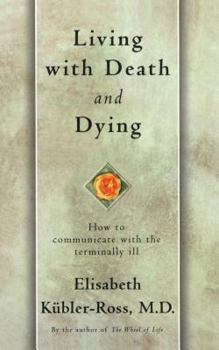Living with Death and Dying: How to Communicate with the Terminally Ill
Select Format
Select Condition 
Book Overview
In this compassionate and moving guide to communicating with the terminally ill, Dr. Elisabeth K ebler-Ross, the world's foremost expert on death and dying, shares her tools for understanding how the dying convey their innermost knowledge and needs. Expanding on the workshops that have made her famous and loved around the world, she shows us the importance of meaningful dialogue in helping patients to die with peace and dignity.
Format:Paperback
Language:English
ISBN:0684839369
ISBN13:9780684839363
Release Date:June 1997
Publisher:Scribner Book Company
Length:181 Pages
Weight:0.45 lbs.
Dimensions:0.7" x 5.0" x 8.0"
Customer Reviews
4 ratings
Generous introduction on how to anticipate and accept death
Published by Thriftbooks.com User , 16 years ago
Having to anticipate death is a difficult task. Author of this book handles questions on death due to terminal illness in both adults and children. One learns about five phases of death: denial, anger, barganing, depression and acceptance. It is wonderful book because it explains how to be around dying people and allow them to have closure, let go and die in dignity regardless of the amount of suffering they go thru, regardless of the quality of the relationship they have with their family and regardless of which phase of dying the patient is. We learn that all people experience similar emotions and no matter if they have belief in God or not they are all able to reach peace and grace at their last minutes of life. Often times, they know when their time is coming. Real life stories described in this book can help reader come to terms on how to listen to dying and their needs in order to make this transition easier for everyone involved in the process: patients, family, doctors, hospital staff. Very helpful book and generous in its humanity of the last minutes of life in this world.
A very insightful and sympathetic written work that explores humanity and humanism by way of living
Published by Thriftbooks.com User , 19 years ago
The data and writings of Dr. Elizabeth Kubler-Ross are really perceptive and affecting, because they show the living what can be possible versus what just is, as well as how life can and should be lived: to the fullest and most meaningful way possible. And with all Kubler-Ross's previous books, Living with Death and Dying is no exception. In this, her fifth book, she looks at the progression of palliative care by way of parent-pediatric involvement (see Section III, Parent Care: Total Involvement in the Care of a Dying Child). In it, a mother movingly recounts the dying of her daughter with leukemia and all the stresses that were attached to the situation. But what mitigated the sadness of the inevitable was the direct involvement of the parents in the care of their daughter to the bitter end. And where a loss of this magnitude can often cause separartion and ulitmately divorce, the unified confrontation by the husband and wife and the other healthy child (in this particular case), actually solidified the nucleus of the family; the bond became tighter and unbreakable, which was very nice to know. But though the loss was understandably painful, it was also a gift, for it brought about a heightened acuteness of love and living, not just through words but by actions and the uncommon stepping outside of the 'comfort' zone of their day-to-day reality. Also interesting was the in-depth exploration of drawing-analysis of the soma (the body) and the psyche (the soul) in regards to terminally-ill patients and those deeply psychologically wounded (read Section II, The Use of Drawings Made at Significant Times in One's Life). It is a great illustration of nonverbal communication and truly eye-opening when you explore the 'hidden' messages that are not as concealed as one might think. Because of the merciful candidness, courage and knowledge of patients, families, clergy and medical staff, like Elisabeth Kubler-Ross, among others, they have mentally brought readers to the brink of death by their own experiences and observations. Through death and dying, they have taught that openness and candor are imperative and that compassion and goodness does not have to begin when death and dying enters the scene.
contains everything you need to know about death & dying
Published by Thriftbooks.com User , 25 years ago
This is another one of Dr. Kubler-Ross' sensitive books on death and dying. Her informed and emphathic approach to the topic should be read by everyone since death and dying are universal. You learn about the functioning of the human mind, the unique aspects of our existence, and will emerge from the experience enriched and with fewer anxieties about your own life.
Very helpful and inciteful book.
Published by Thriftbooks.com User , 25 years ago
I read this book back in 1973, that is . the first publication of her clinical study. It was wonderful for me to be given a clear and inciteful understanding of the people around the loved one dying, let alone understanding the probable emotions of the person dying. As a caregiver, a term not used back then, I had no knowledge of the stages people go through in the event of a terminal disease. These "stages" were extremly helpful to me in understanding my own emotions and in caring for the sick one. This book was a God send for me.





